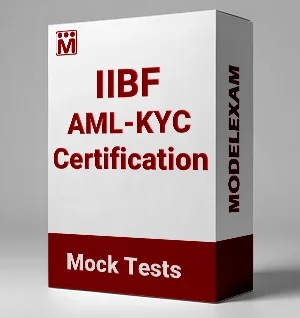Certificate Examination in Anti-Money Laundering & Know Your Customer (AML/KYC)
AML-KYC Mock Tests
Certificate Examination in Anti-Money Laundering & Know Your Customer

Why AML-KYC Certification?
Compliance with "Know Your Customer" guidelines and "Anti-Money Laundering" standards has become necessary for healthy financial relationships both by the banks / financial institutions in India.
Objective of IIBF AML - KYC Exam
- To provide a comprehensive coverage of the various guidelines / standards / guidance notes issued by RBI / IBA / International bodies etc.
- To provide advanced knowledge and understanding in AML / KYC standards.
- To develop the professional competence of employees of banks and financial institutions.
Eligibility:
1. Members and Non-Members of the Institute
2. Candidates must have passed the 12th standard examination in any discipline or its equivalent or Candidate who have completed BC/BF examination conducted by IIBF
PASSING CRITERIA:
Minimum marks for pass in the subject is 60 out of 100.
Fee Structure:
Members of IIBF – Rs 1000 + GST
Non Members Rs 1500/- + GST
MEDIUM OF EXAMINATION : Examination will be conducted in English only.
PATTERN OF EXAMINATION:
- 120 objective type multiple choice questions for 100 marks.
- Online Mode only
- There will NOT be negative marking for wrong answers.
Syllabus:
- AML – Anti Money Laundering
- Money Laundering - Origin - Definition - Techniques Impact on Banks - Structuring; Integration, Preventive Legislations - International Co-operation -UK; USA; India - Basel Committee - PMLA Objectives - RBI Guidelines -System Adequacy to Combat Money Laundering - Antiterrorism finance - Financial Intelligence Unit (FIU), The Financial Action Task Force (FATF) - IBA Working Group - Software for AML Screening : Money Laundering and Correspondent Banking - Exchange Companies - Foreign Branches
- Know Your Customer - Introduction and overview Customer Profile - KYC Policies - Countries Deficient in KYC Policies,Initiatives by the RBI - Organised Financial Crimes Customer - Definition under the KYC Principles - Transaction Profile - Organisational Structure - Important KYC framework in RBI prescriptions - Operating Guidelines. Introduction of new accounts - Guidelines for Opening Accounts of Companies, Trusts, Firms, Intermediaries etc., Client Accounts opened by Professional Intermediaries - Trust / Nominee or Fiduciary Accounts - Accounts of Politically Exposed Persons (PEPs) Residing Outside India, Accounts of ‘non-face-to-face’ Customers - Qualitative data - Joint accounts - Minor accounts - KYC for existing accounts - KYC for low income group customers. Monitoring Accounts - Customer research - Suspicious transactions